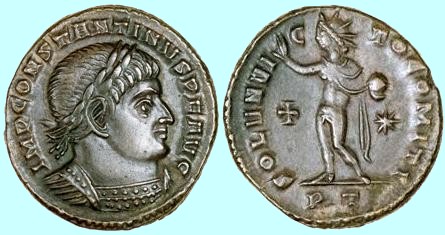COGaIC’s David Hulme: Paul, Paula, and Constantine

Coin Featuring Emperor Constantine and the Pagan Sun Deity Mars Produced 317 A.D.
(Well After Constantine Professed Christ)
COGaIC has an interview between its David Hulme (DH below) and Paula Fredriksen (PF below) who is a Professor of the Appreciation of Scripture at Boston University, currently featured at its Vision website:
DH You’ve noted that the divide between Judaism and Christianity resulted from politics within the Roman Empire and Constantine’s decision in favor of Roman Christianity. Under Constantine the Sabbath was officially changed to Sunday and Christians were told not to confer with rabbis on the dating of Easter. What would Paul have made of that if he were living in that period?
PF We habitually refer to the conversion of Constantine. I think it’s more appropriate to say that under Constantine we have the conversion of Christianity. Christianity under Constantine becomes a form of imperial Roman culture. One Christian denomination is favored with his patronage. They get tax breaks. They get big, beautiful Bible codices copied at public expense. They can use the imperial post for free. They ask Constantine to kick out the leaders of the other Christian denominations in town. So the people who get the worst treatment after Constantine becomes a patron of this one church are other Christians. More Christians are persecuted after the conversion of Constantine than before, because they’re targeted by one particular branch of the church.
Paul’s first reaction to all of this would be that the type of Christianity Constantine is patronizing is very different from what Paul enunciated. The fact that Constantine’s Christianity understands itself as the only one that’s true to what Paul taught wouldn’t help the historical Paul’s shock in seeing how different Constantine’s Christianity was from his own. For one thing, when Constantine’s official biographer, Eusebius, writes about the emperor, he sees the foundation of the Christian Roman Empire as “Isaiah’s peace”—the Messianic peace promised in what we call the Old Testament. When Paul’s thinking about the kingdom of God, he’s certainly not thinking of the Roman emperor as His agent.
The truth is that the apostles kept Passover on the 14 and NOT Sunday (it was not called “Easter” back then and I really wish that David Hulme would not have used that inappropriate term). The true Christians had so many practices that differed from those accepted/enforced by Emperor Constantine that Paul and the others would not have considered Emperor Constantine and his supporters as Christian.
The fact is that Emperor Constantine WAS NOT a true Christian. True Christians do not kill. True Christians are not persecutors. True Christians do not continue to honor pagan deities.
People may be surprised to realize that the predominant idea of the Godhead accepted by over a billion people was because of the pagan Emperor Constantine. Protestant scholar H. Brown noted:
Although Constantine is usually remembered for the steps he took toward making Christianity the established religion of the Roman Empire, it would not be wrong to consider him the one who inaugurated the centuries of trinitarian orthodoxy. It was he who proposed and perhaps even imposed the expression homoousis at the Council of Nicea in 325, and it was he who provided government aid to the orthodox and exerted government pressure against nonconformists (Brown HOJ. Heresies: Heresy and Orthodoxy in the History of the Church. Hendrickson Publishers, Peabody (MA), 1988, pp. 332-333).
But sadly, almost all the world’s so-called Christians accept non-biblical doctrines endorsed and/or proposed by Emperor Constantine.
But the true Christians never accepted his non-biblical practices or beliefs.
Do you want to obey God or men?
Articles of related interest may include:
The History of Early Christianity Are you aware that what most people believe is not what truly happened to the true Christian church? Do you know where the early church was based? Do you know what were the doctrines of the early church? Is your faith really based upon the truth or compromise?
Binitarian View: One God, Two Beings Before the Beginning Is binitarianism the correct position? What about unitarianism or trinitarianism?
Did the True Church Ever Teach a Trinity? Most act like this is so, but is it?
Tradition and Scripture: From the Bible and Church Writings Are traditions on equal par with scripture? Many believe that is what Peter, John, and Paul taught. But did they?
 |
Tweet |
|